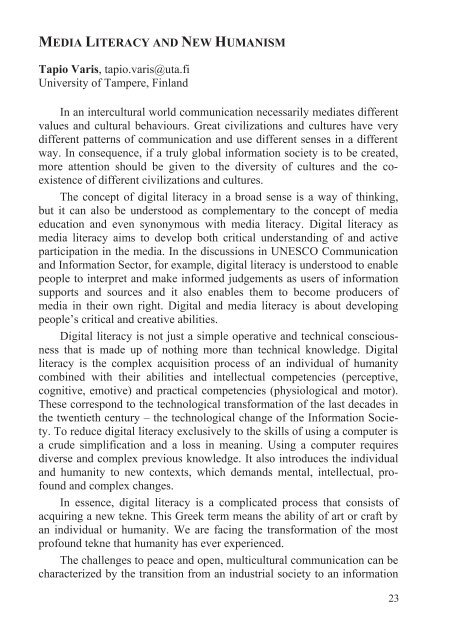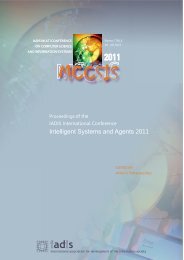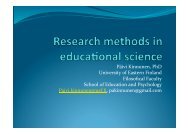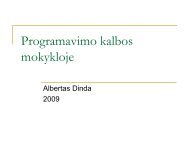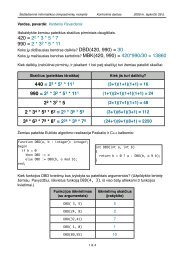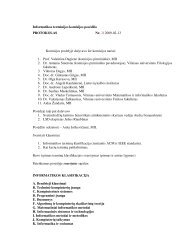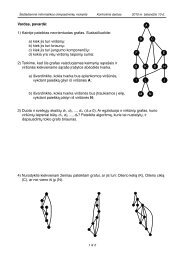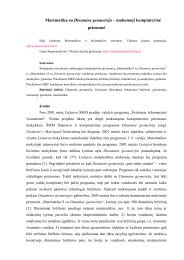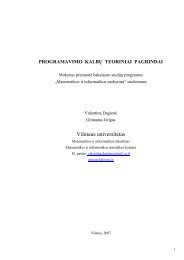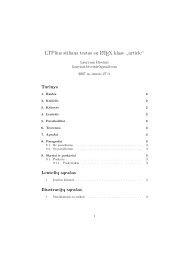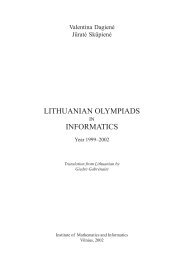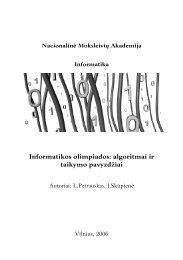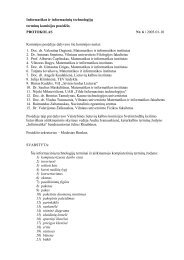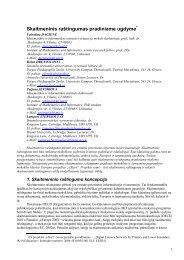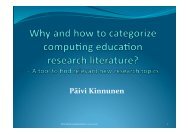innovation - Informatikos metodologijos skyrius - Matematikos ir ...
innovation - Informatikos metodologijos skyrius - Matematikos ir ...
innovation - Informatikos metodologijos skyrius - Matematikos ir ...
You also want an ePaper? Increase the reach of your titles
YUMPU automatically turns print PDFs into web optimized ePapers that Google loves.
MEDIA LITERACY AND NEW HUMANISM<br />
Tapio Varis, tapio.varis@uta.fi<br />
University of Tampere, Finland<br />
In an intercultural world communication necessarily mediates different<br />
values and cultural behaviours. Great civilizations and cultures have very<br />
different patterns of communication and use different senses in a different<br />
way. In consequence, if a truly global information society is to be created,<br />
more attention should be given to the diversity of cultures and the coexistence<br />
of different civilizations and cultures.<br />
The concept of digital literacy in a broad sense is a way of thinking,<br />
but it can also be understood as complementary to the concept of media<br />
education and even synonymous with media literacy. Digital literacy as<br />
media literacy aims to develop both critical understanding of and active<br />
participation in the media. In the discussions in UNESCO Communication<br />
and Information Sector, for example, digital literacy is understood to enable<br />
people to interpret and make informed judgements as users of information<br />
supports and sources and it also enables them to become producers of<br />
media in the<strong>ir</strong> own right. Digital and media literacy is about developing<br />
people’s critical and creative abilities.<br />
Digital literacy is not just a simple operative and technical consciousness<br />
that is made up of nothing more than technical knowledge. Digital<br />
literacy is the complex acquisition process of an individual of humanity<br />
combined with the<strong>ir</strong> abilities and intellectual competencies (perceptive,<br />
cognitive, emotive) and practical competencies (physiological and motor).<br />
These correspond to the technological transformation of the last decades in<br />
the twentieth century – the technological change of the Information Society.<br />
To reduce digital literacy exclusively to the skills of using a computer is<br />
a crude simplification and a loss in meaning. Using a computer requ<strong>ir</strong>es<br />
diverse and complex previous knowledge. It also introduces the individual<br />
and humanity to new contexts, which demands mental, intellectual, profound<br />
and complex changes.<br />
In essence, digital literacy is a complicated process that consists of<br />
acqu<strong>ir</strong>ing a new tekne. This Greek term means the ability of art or craft by<br />
an individual or humanity. We are facing the transformation of the most<br />
profound tekne that humanity has ever experienced.<br />
The challenges to peace and open, multicultural communication can be<br />
characterized by the transition from an industrial society to an information<br />
23


